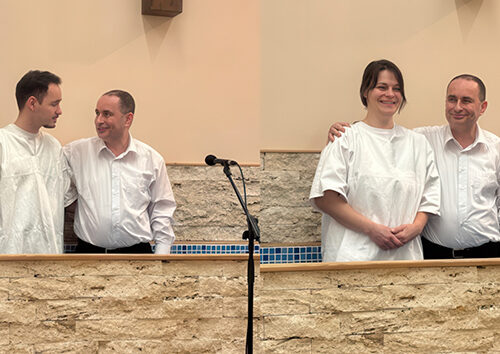12 September| St Albans, UK [Don W McFarlane]
In this tedNEWS feature, the spotlight falls on church leadership. Few voices are better placed to speak on the subject than Don McFarlane. Although retired and now living in Lincoln, UK, Don continues to answer the Church’s call to share his wisdom and experience in various roles. Over recent years, he has offered valuable reflections on leadership. In this article, he turns his attention to administrative leadership, while in the accompanying video interview, he opens up about the heart of pastoral leadership.
Eleven things I learnt while in church administration
After fifty years of ministry, twenty-seven of which were spent in church administration and almost 23 in local church pastorates, I am able to look back reflectively and analytically. Some memories produce a warm and fuzzy feeling; some are nightmare-inducing, while some elicit responses such as: ‘Only the Lord got me through that.’ Along the way, I learnt a few things about church leadership – some I wish I had learnt earlier rather than later. In this article, I will briefly share eleven things that I learnt about church administration and leadership, using somewhat prosaic subheadings.
Fly in a helicopter!
Let me be quick to disabuse you of any notion that Adventist Church administrators routinely fly in helicopters, though that might prove helpful in certain large territories. The church administrator/leader needs to have what is usually described as a ‘helicopter view’ of the organisation or department they are leading. While others are concentrating on the tasks in their assigned areas of responsibility, the administrator/leader needs to take a panoramic view of the organisation to see where emphasis needs to be placed and where changes are required for greater effectiveness.

From time to time, administrators are tempted to make promises that they cannot keep, or that might place the organisation they lead in a difficult position. The elders of a church may invite a conference treasurer or president to meet with them after the worship service. In that meeting, the administrator is told, ‘We have found a building for £1 million. We have £500,000 in hand and are asking the conference to help us with £500,000.’ The administrator would be unwise to make a promise in such a situation, other than to share the request ‘with the brethren’. In so doing, the administrator moves the responsibility to respond to the request from themselves to the shoulders of ‘the brethren’ – fellow administrators and the executive committee. The administrator must be careful not to make promises that they are not in a position to fulfil on their own.
It’s not yours!
I am always bemused when a pastor introduces himself or herself by saying, ‘My name is Pastor So-and-So.’ Did they change their name by deed poll or a similar process? ‘I am Pastor So-and-So’ is the acceptable form of introduction. Similarly, a church administrator’s name is not President, Secretary, Treasurer, Director or Manager. They don’t own the position, but serve at the will of the constituency, and are accountable to the constituency. It is good practice for an elected leader of the church to pack away their personal belongings that are kept in the church office at the end of the term for which they have been elected, in readiness for the newly elected person to move in following a session. It should never be assumed that one will be re-elected to office.
Someone has to do it!
When a pastor is invited to work as an administrator or a department director, is that considered a promotion? Fully understood, there is no promotion beyond the calling to be a pastor. No work in the church is of greater importance than that of bringing souls to Christ and nurturing them in their endeavour to reflect Christ’s character. Nevertheless, someone has to provide leadership in various aspects of church work, and, from time to time, pastors are invited to those roles. Someone has to do it! A pastor becoming an administrator or department director is given wider responsibilities, as opposed to being promoted.
The Holy Spirit does not fall on institutions!
I was once of the view that our schools, hospitals, colleges, health-food factories, and publishing houses enjoyed divine favour, and consequently had an edge over their secular counterparts. That myth was shattered by the reality of falling student enrolment in our educational institutions, the closure of health facilities, and falling demand for products from our health-food establishments and publishing houses. The truth, which is often uncomfortable for some church leaders, is that Adventist institutions, if they are to succeed, must offer quality products and services that are on a par with or superior to those offered by the external competition. Ellen White said that the Holy Spirit does not anoint programmes and plans, but men and women. The same is true of our institutions.

Criticism of a leader/administrator is inevitable. ‘A leader is there to be shot at,’ someone once said to me! While they did not mean it literally, it is true that, at times, criticism of church administrators is warranted. They are not going to get everything right. However, if they are to function effectively, in general, the response to criticism should be the same as that to compliments – they are not to get to one’s head. While constructive feedback should be taken seriously and processed in a manner that is of benefit to the leader, focusing on criticism has the potential to stress one out and make them ineffective. Neither should compliments and commendation be taken to heart and regarded as evidence of success.
Keep good company!
At no stage in my many years in church administration did I consider myself the cleverest person in the room. I learnt early on that it was important to surround myself with people who were smarter than me. Leadership success is built upon discussion and the embracing of ideas, collaboration, and consensus. So it’s always a plus to have smart people at the table who have a love for the organisation and a passion for its advancement. In addition, it is crucial to have team members who disagree with the administrator/leader in certain matters. This should be preferred to having ‘yes-persons’ whose sole aim is to gain the administrator/leader’s favour and protect their position.
Maintaining the status quo keeps the boat steady, but seldom takes us to our desired destination!
If today I were to return to the Handsworth/Newtown district in Birmingham, UK, where we baptised more than 100 people in 1979, and employed the same evangelistic strategies that we used then, it is doubtful that even 10 per cent of that number would be baptised today. In the 1950s, a period described as ‘the Age of Large Things’ in the British Seventh-day Adventist Church, more than 10,000 attended the first night of George Vandeman’s evangelistic campaign in London. Hundreds came to Christ as a result of his ministry. In the 1980s, Vandeman was brought back to conduct a campaign in the NEC, resulting in fewer than three people getting baptised, despite the large sum of money that was spent on this endeavour. Our core values and beliefs are based solidly on God’s Word and should not change, but methods, structures, delivery style, language and nurturing approaches need to change with the times to ensure that the Gospel remains Present Truth.

Whether it was their liberation from Egypt, their deliverance from Haman’s murderous plot, or the arrival of harvest time, the Jews never missed an opportunity to celebrate God’s goodness in their lives. Celebration kept before them the mercies and promises of God and the hope of a glorious future. The church must also embrace every opportunity to celebrate God’s guidance and blessings. This reinforces faith, strengthens resolve, and conveys to the next generation the passion of our relationship with Christ. On the eve of the year 2000, the South England Conference hired the Royal Albert Hall to celebrate 2,000 years of Christianity. That event still resonates warmly with many who attended. Celebratory events, such as camp meetings and days of fellowship, have a similar effect.
Do not despise the little red fox!
In a legendary story, the owl was approved by the majority of animals in a forest as their new king. The only dissenting voice was that of a little red fox. He told his fellow animals that it wasn’t a good idea to have the owl as their king, because he could not see clearly in daylight. He was shouted down and chased away. Delighted with their choice of a new king, the animals visited the owl at his home and shared their decision with him. The owl was delighted and accepted their invitation to lead them on a march. The procession finally arrived at a highway. To the amazement of the other animals, the owl started walking down the middle of the highway, but they deferred to his celebrated wisdom and joined him. A lorry soon came down the highway and crushed them all to death. The only survivor was the little red fox. As he surveyed the carnage, he kept repeating, ‘I told them that he couldn’t see clearly in daylight, but they did not listen to me.’ Often, the member in a church or on a committee who is the most diffident and the least lettered is the one in whom the greatest wisdom resides.

Church administration involves many moving parts – management of employees, oversight of institutions, formulating strategic plans, being engaged in pastoral and evangelistic work, planning and leading events, chairing or attending a plethora of committees, dealing with emergency matters or unexpected situations that have arisen, interfacing with the general public, responding to members’ queries and complaints. A typical working week for a conference president could easily be up to eighty hours. It is easy to become so engrossed with the day-to-day tasks associated with one’s role in the church that the administrator loses sight of the fact that he or she is involved with a divinely appointed enterprise through which God is working to restore humanity to its rightful place in the cosmos. When this is kept in mind, the administrator is more likely than not to find immense joy and fulfilment in his or her work.
“Eleven Things I Learnt While in Church Administration” was first published in Messenger, Volume 127/10 (November 2022), used with permission.
To discover more about character-driven leadership, “Today’s Leader 50 Timeless Leadership Principles”, a collaborative work by David Neal, Don W McFarlane, and Josney Rodriguez, considers the ageless principles of leadership that the twenty-first century may have forgotten. Published by Stanborough Press, the book is available through Life Source Christian Bookshop



